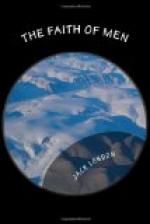Then came a snap on Lake Le Barge, when the cold of outer space smote the tip of the planet, and the force ranged sixty and odd degrees below zero. Here, labouring with open mouth that he might breathe more freely, he chilled his lungs, and for the rest of the trip he was troubled with a dry, hacking cough, especially irritable in smoke of camp or under stress of undue exertion. On the Thirty Mile river he found much open water, spanned by precarious ice bridges and fringed with narrow rim ice, tricky and uncertain. The rim ice was impossible to reckon on, and he dared it without reckoning, falling back on his revolver when his drivers demurred. But on the ice bridges, covered with snow though they were, precautions could be taken. These they crossed on their snowshoes, with long poles, held crosswise in their hands, to which to cling in case of accident. Once over, the dogs were called to follow. And on such a bridge, where the absence of the centre ice was masked by the snow, one of the Indians met his end. He went through as quickly and neatly as a knife through thin cream, and the current swept him from view down under the stream ice.
That night his mate fled away through the pale moonlight, Rasmunsen futilely puncturing the silence with his revolver—a thing that he handled with more celerity than cleverness. Thirty-six hours later the Indian made a police camp on the Big Salmon.
“Um—um—um funny mans—what you call?—top um head all loose,” the interpreter explained to the puzzled captain. “Eh? Yep, clazy, much clazy mans. Eggs, eggs, all a time eggs—savvy? Come bime-by.”
It was several days before Rasmunsen arrived, the three sleds lashed together, and all the dogs in a single team. It was awkward, and where the going was bad he was compelled to back-trip it sled by sled, though he managed most of the time, through herculean efforts, to bring all along on the one haul. He did not seem moved when the captain of police told him his man was hitting the high places for Dawson, and was by that time, probably, half-way between Selkirk and Stewart. Nor did he appear interested when informed that the police had broken the trail as far as Pelly; for he had attained to a fatalistic acceptance of all natural dispensations, good or ill. But when they told him that Dawson was in the bitter clutch of famine, he smiled, threw the harness on his dogs, and pulled out.




